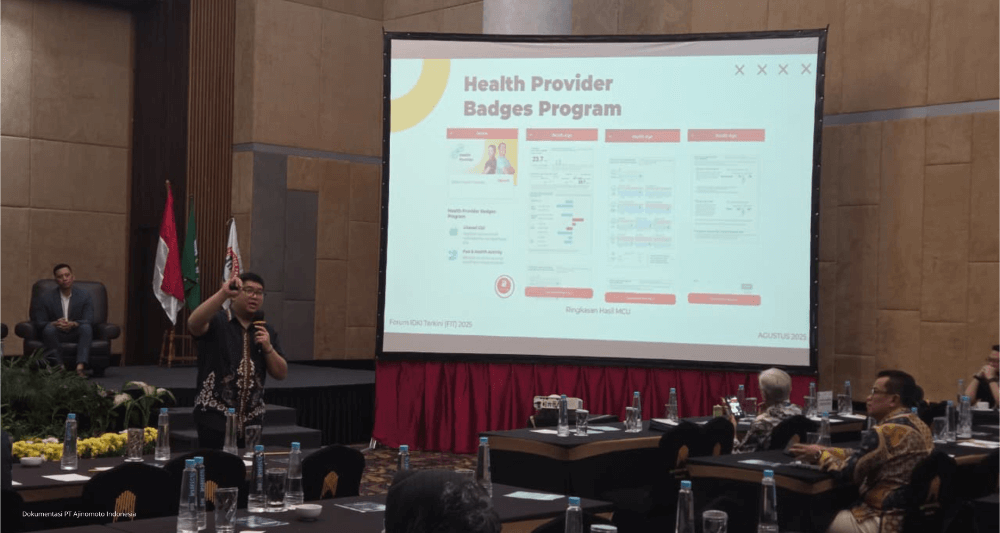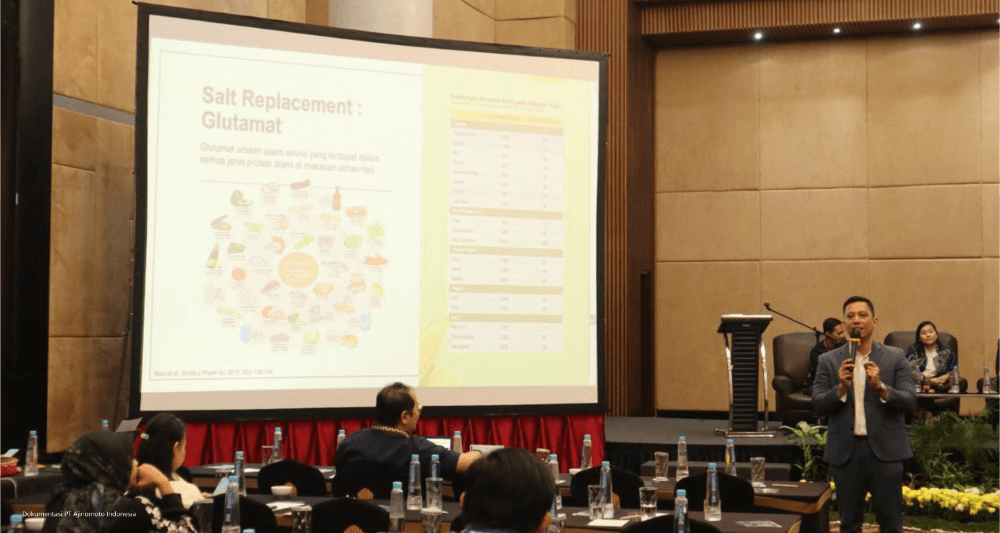Jakarta– PT Ajinomoto Indonesia strengthens its commitment to creating a healthy and safe working environment by participating in the Occupational Health Symposium and Workshop held by the Indonesian Occupational Health Doctors Association (IDKI) at the Manhattan Hotel, Kuningan, Jakarta.
The event brought together occupational health experts and practitioners, including company doctors, HRD, and HSE professionals from various industrial sectors, with a focus on enhancing the capacity of company doctors in addressing modern occupational health challenges. As a professional organization under the Indonesian Medical Association (IDI), IDKI plays a role in strengthening the contribution of company doctors through preventive, curative, and rehabilitative services, while encouraging cross-sector collaboration so that the business world can adapt to the complexity of occupational health issues in the modern era.
Ajinomoto's participation in this event is in line with the company's goal of supporting sustainable well-being for people, society, and the earth through its AminoScience approach. Not only does Ajinomoto contribute externally, but it also actively builds a culture of healthy living within the company through various Ajinomoto Health Provider initiatives.
One of the flagship programs introduced is the Health Provider Badges Program, a corporate educational initiative aimed at improving nutrition and health literacy among employees.
According to Indra Nurcahyo, Head of Human Resources Department – PT Ajinomoto Indonesia, "The company also needs to create ‘attractive programs that can change our employees’ healthy behavior' to raise awareness of the importance of health among employees. This program has proven to be effective, marked by a significant increase in health age as reflected in the results of the annual Medical Check Up (MCU) of employees. In addition, changes in balanced nutrition eating patterns can also be seen, which have grown through active participation in these educational programs. There are also supporting activities in the form of Fun & Health Activities, which include ‘exercise’ and ‘lose weight challenge’ activities. The synergy between education and physical activity encourages employees to be more concerned about healthy lifestyles, thereby having a positive impact on employee health and overall work productivity," he said.

The success of this program was conveyed directly by Dr. Rafael Nanda R, MKK, Deputy Secretary of the IDKI Central Board in a session titled “Nutrition Related Diseases Program at Work”. He said that the implementation of this program at Ajinomoto has had a significant positive impact. "We have seen an improvement in the results of employee medical check-ups (MCU) after participating in this program. This shows that consistent education and a structured approach can encourage healthy behavioral changes in the workplace," said Dr. Rafael.
In an effort to continue improving physical health at work, it is also important for every worker to maintain a more balanced daily food intake, neither too little nor too much. This way, employees can avoid degenerative diseases such as hypertension and diabetes, which often do not show specific symptoms.

Further discussing degenerative diseases and prevention recommendations, Dr. Yohan Samudra, SpGK, AIFO-K, a clinical nutrition specialist at Premier Bintaro Hospital, elaborated in a session titled “Be Wise in Using Salt.” He explained that degenerative diseases are chronic conditions characterized by damage and deterioration of cells, tissues, or organs over time, which are generally triggered by aging and unhealthy lifestyles. One example is heart and blood vessel disease, which often starts with hypertension, a condition in which blood pressure continuously exceeds normal limits. One of the triggering factors is excessive salt consumption.
On average, Indonesians consume twice the amount of salt recommended by the World Health Organization, which is 5 grams or about one teaspoon per day. In fact, 5 out of 10 Indonesians exceed this amount. To address this, the solution is to Bijak Garam by reducing salt use when cooking and adding a little monosodium glutamate (MSG). This way, our sodium intake is reduced, and the food we consume remains delicious. Why is this possible? Because, in fact, compared to regular table salt, the sodium content in MSG is only 1/3, which is less.
The Bijak Garam campaign aims to educate the public about the importance of reducing salt consumption to lower the risk of hypertension, without sacrificing taste. Ajinomoto offers practical solutions through simple applications that maintain the deliciousness of dishes. Just use 1 teaspoon of salt and ½ teaspoon of AJI-NO-MOTO® MSG for 1 liter of water or cooking broth.
Through active participation in this symposium, Ajinomoto Indonesia hopes to continue strengthening its collaboration with stakeholders in the field of occupational health. By creating a healthy and sustainable work environment, the company believes that employee productivity and well-being can go hand in hand, contributing positively to national development.
For more information about the Ajinomoto Health Provider initiative and other activities of PT Ajinomoto Indonesia, visit www.ajinomoto.co.id or follow Ajinomoto Indonesia's official social media channels.